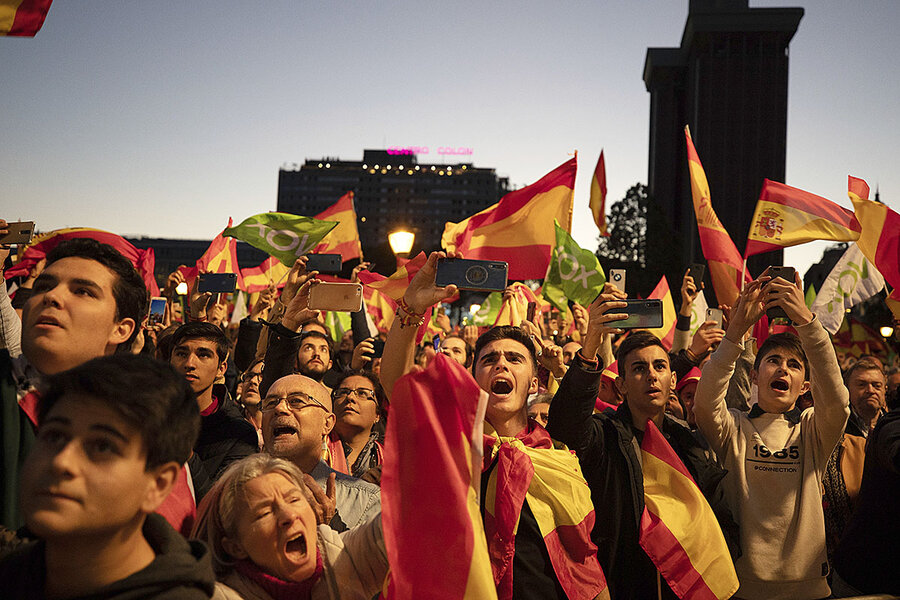With rise of Vox, Europe's populist wave reaches Spanish shores
Loading...
| Granada, Spain
Lola Enriquez, from the small district of Maracena in Granada, hasn’t always been open about her support of Vox, Spain’s ultranationalist party. When she first joined the movement in 2015, fears of being called a fascist in her home – an area she describes as a “red enclave” – pushed her to keep a low profile.
But no longer. Today Vox is set to enter parliament after winning over more than 10% of voters in Spain’s general election on Sunday. It is the first far-right party to gain a foothold in the Spanish legislature in the country’s democratic history – an achievement unthinkable just a few years ago.
While still on the fringe – the party placed fifth – it is an “inspiration” to a potpourri of Spanish citizens. Supporters include devout Catholics, underpaid or unemployed youths, pensioners unable to make ends meet, farmers and small enterprise workers, and qualified professionals with international experience.
Why We Wrote This
Why have some Spanish voters now embraced an ultranationalist party in a country that has been so reluctant to do so for so long?
“We are gaining strength,” Ms. Enriquez says outside the poorly lit Vox campaign office at a high-end hotel in Granada. “We have a lot of hopes, although we are aware that other parties have more weight. … People might take our material discreetly, but they take it. They used to call us fascists – some still do – but our vision and our numbers are growing.”
Extreme necessity?
The rise of Vox (“voice” in Latin) has been quick. It won seats for the first time in December local elections in Andalusia. In the span of five months, it has picked up 24 seats in the national legislature.
“We told you that we were starting a reconquest of Spain, and that is exactly what we have done,” said Vox leader Santiago Abascal, who mobilized such sizable crowds ahead of the vote that supporters dreamed of a stronger outcome while critics panicked over rising fascism. “We can can clearly say to all of Spain that Vox is here to stay.”
Vox rejects the far-right label, casting itself as a party of “extreme necessity.” But its view on immigration and Islam place it in the camp of European right-wing populist parties such as France’s National Front and Italy’s League.
Vox has outlined its vision in a 100-point manifesto of “urgent measures.” Its family-first worldview translates into a desire to repeal laws against gender violence, and opposition to abortion and same-sex marriage. The party wants to expel legal migrants in Spain if they have committed an offense and wants to prevent unauthorized migrants from staying.
Supporters cast themselves as the victims of a “so-called progressive” fascism that has imposed liberal values. They defend Spanish traditions such as bullfighting and want to relax gun ownership laws.
The party also defends centralization of government, a message that resonated strongly among some voters in the wake of Catalonia’s independence bid in 2017, which was later declared illegal. One of the seats it picked up on Sunday was in Barcelona, the capital of the Catalonia region.
“Vox defends my values, Spanish unity above them all,” says Paloma Gomez, a lawyer who worked in England, Italy, and Switzerland before returning to Granada for the elections. “Every country has to defend what is theirs. You cannot break up Spain.”
But critics see the party as a throwback to the dark decades of dictatorship. “Vox is still too radical,” says Alicia Martinez, a working mother who sells marmalade in flavors ranging from sweet pepper to olive oil. “They are right in a couple of things, but they want to take us back 40 years.”
Migration in farm country
One region where Vox boasts above average support is in the so-called “Mar de plástico” (sea of plastic), the southeastern province of Almería. Intensive farming in this area has covered the arid landscape with hundreds of miles of greenhouses that glitter almost as much as the Mediterranean on a sunny day. Farmers here are largely dependent on migrant labor.
Sub-Saharan Africa migrants roam back roads on basic bicycles in the hope that a sympathetic – or unsympathetic – Spanish farmer will grant a day of labor at €35. “It’s the best we can get,” says Mohammed from Senegal, who arrived by boat and has spent two years as an undocumented migrant in Spain.
Just down the road, Luis, a Vox supporter, is using a tractor to clear his fields. Declining to give his last name, he pauses the engine just long enough to explain that he is “up to here” with illegal migration. He says that while he employs 108 migrants legally at his tomato and watermelon farms, hiring unauthorized migrants asks too much of farmers and needs to be stamped out.
“If they come, they should come with their contract in hand and not in boats brought over by mafias,” he argues (though getting a seasonal work visa abroad is often impossible for migrants). “The poor guys are coming at any cost, even if they drown. On this end, if we take pity and give them a job, we get fined €8,000 to €9,000.”
Elsewhere in the province of Almería, it is clear that feelings against migrants don’t stop with those whose presence in Spain is unauthorized. Graffiti such as “No Moors” is carved onto walls and even solitary rocks on dirt roads leading to national park and beaches that have the coasts of Morocco in sight.
In the town of El Ejido, where Vox had the support of roughly a fifth of voters, discussions on migration can border on the choleric. The town has nearly 85,000 people, roughly a third of them classed as foreign, with Morocco being the most common country of origin. Accounts of racial tensions that exploded around a murder almost 20 years ago in 2000 are relayed as if they happened yesterday, even by those who were too young to have their own memory of the event.
“That is something you don’t forget,” says Manuel Fuentes, a 20-year-old agriculture student on his third unpaid internship. “My mother is scared to walk the streets alone. There are many things I don’t like about Vox, such as their views on gender, but on the question of migration, it is the only party that calls it as it is.”
‘They say we are racist, but we have to be’
Some in El Ejido say that the presence of migrants in town makes them worry about increased crime, particularly against women, as well as religious tensions. That’s why they say they support Vox.
“We are all for Vox,” says Antonio, who considers himself a failed businessman. “They say we are racist, but we have to be. It can’t be that our streets are unsafe after 9 p.m. It can’t be that these people get benefits while the poor of Spain don’t.”
“They get all the help, and then they don’t respect our values,” chimes in Ana, a young salesperson out at a cafe. “I don’t see this as a far-right issue. You just have to put some rules.”
While Vox has toned down its public rhetoric by deploying the more widely palatable terminology of “uncontrolled migration,” anti-Muslim videos circulate freely over WhatsApp messages exchanged by its members.
Conchi Perez, monitoring the elections at a school in the outskirts of Granada, says the Vox movement has restored her pride in Spain. “It has revived so many values that lay dormant: love of the homeland, Spanish unity, the greatness of Spain. Don’t forget, we reached five continents.”







